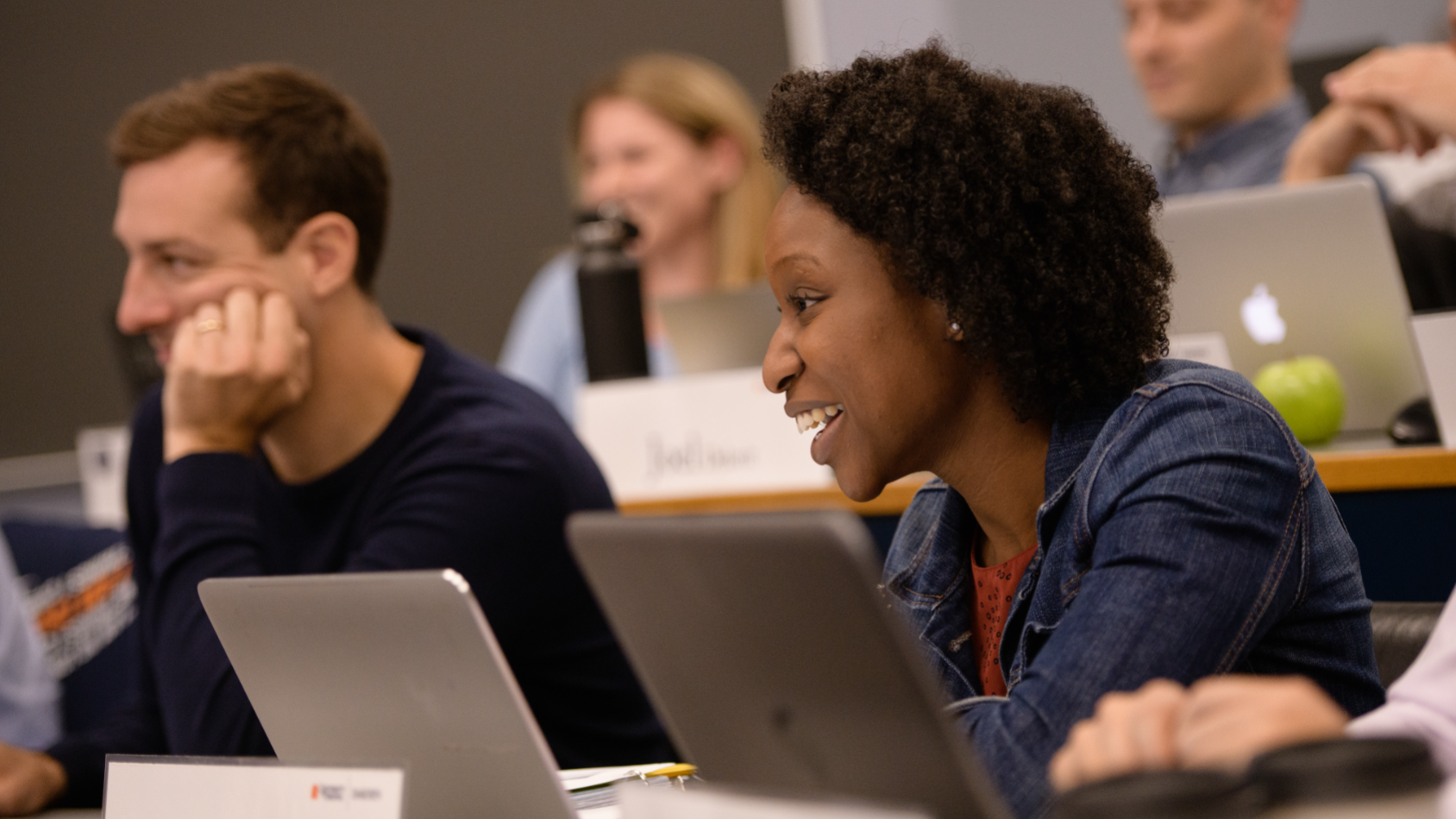There’s little else more nerve-wracking in the job or internship application process than preparing for an interview. Plus, MBA students might have various competing priorities during the traditional internship recruiting cycle—exams, holiday travel, spending time with family—not to mention trying to catch up on sleep and personal wellness.
As part of Darden’s career education curriculum, over a dozen Career Development Center (CDC) advisers and Second Year coaches recently held question and answer sessions designed to provide First Years with tailored, industry-specific interviewing guidance and recommendations.
Read on for helpful tips from CDC advisers with decades of sector experience and the Second Year coaches who successfully navigated the First Year recruiting cycle just months ago.
Consulting Case Interview Tips
Practice case interviews with diverse, insightful individuals.
CDC advisers frequently encourage First Year students to practice case interviews with a diverse set of classmates and Second Years to seek out critical and constructive feedback.
“Don’t case too much with your friends. Case with people who scare you.” — Brad Erla, Second Year coach, summer consultant and incoming consultant at BCG.
Assume positive intent, but don’t assume interviewers have read your resume.
Gunville reminded students that while they may have spent months connecting with alumni at consulting firms, those new acquaintances may not actually participate in January interviews.
Senior client service personnel typically run the first round interviews, then “you will likely meet partners for your final round interview who may or may not reviewed your resume in detail,” Gunville said.
“Always give context. There’s no guarantee that they looked over your resume.” — Second Year coach Tim Gao, who spent his summer interning with BCG.
Be adaptable and incorporate feedback between first- and second-round interviews.
Many interviewers provide actionable feedback to help you target your practice between rounds one and two of interviews.
“Take it to heart and focus your ongoing practice on the development opportunity they identified. They will be looking for marked improvement in that area before extending you the offer.” — CDC Senior Director of Consulting Careers Christy Gunville.
“Ensure that you never make the same mistakes. Everything you do has a purpose. Know that purpose and make sure the person who is interviewing you knows it, too.” — Second Year coach and former EY-Parthenon summer consultant Franklyn Darnis
Investment Banking Interview Tips
Have answers for basic and advanced technical questions.
“If you miss a technical in the first-round interview, you probably won’t be invited to the second round.” — Second Year coach Jay Jaber, who spent his summer as a Moelis & Company associate.
“In regards to technical questions, answer them and avoid rambling.” — CDC Associate Director of Career Education and Advising Ed Yu
Share real weaknesses and failures. (But make them good.)
Aspiring bankers should prepare for behavioral questions, in addition to a variety of technicals. Students were encouraged to use real-life examples of how they responded to stress and failure.
“Behavioral questions can be equally punitive as technical. Focus on your weaknesses. Do mocks with as many people as you can as early as you can.” — Second Year coach Taylor Pulling, who interned at Deutsche Bank.
Be confident and poised.
Interviewers can ask students questions designed to rattle nerves. Interviews can ask or create adverse conditions designed to test students’ preparation and skills.
To prepare for moments such as these, Yu and Pulling urged students to use resources like Interview Stream and the 400 Investment Banking Interview Questions and Answers guide.

Asset Management Interview Tips
Do your homework on both private and public firms.
Invest significant time in asset management internship interview preparation.
Resources like the Form ADV, PitchBook and the S&P Global Market Intelligence’s Capital IQ Platform are available for researching private wealth management firms and annual filings and reports for public firms. Even company websites and news articles can be fruitful in students’ searches.
Understand the importance of your firm’s location.
Interviewers can dedicate a significant amount of time to inquire about interest in their firm’s location.
“City is especially important, especially for cities off the beaten path.” — Second Year and Darden Capital Management CEO Ryan Claxton, former MBA intern at Assurant
“These aren’t two- or three-year jobs. They don’t anticipate that you’re going to be moving on. It’s a long-term commitment.” — CDC Senior Director of Financial Services Careers Paul Reeder
Have a variety of stock pitches ready to share.
Reeder says the main portion of the interview will be dedicated to pitching a stock and recommended that students have at least three detailed pitches ready to share. Interviewees might spend over 20 minutes on average in an interview discussing stock pitches.
“Don’t pitch Amazon. Understand what the firm does and pitch something that’s aligned with their investment philosophy. Don’t pitch something that’s already in their portfolio. You can bring a one-pager on your pitch. Have a few copies on hand to distribute. It goes a long way after the interview.” — Claxton
Tech Interview Tips
Tell great stories.
Strong answers to behavioral questions are key—even during interviews for MBA internships in technology.
“Behavioral answers can come from academics, personal challenges, athletics, volunteering, anything like that. Give compelling answers.” — Jenny Zenner, CDC senior director of technology careers
Students without tech experience should tie answers to past experiences and make behavioral answers come to life for the listener.
“Include an opening and provide the situation, task and contextual background. Incorporate dialogue into your story. Quotes show tension and challenges you overcame.” — Zenner
Understand the company’s products.
Interviewees should select two or three products associated with each company and be able to speak about those products in-depth. Be informed about any company’s recent acquisitions or breaking news.
“Get to know them well in case you speak with the expert in that field. Understand how the company monetizes products and how they’re positioning them in the marketplace.” — Zenner
Remember you could have a different timeline from other industries.
While First Year students recruiting for internships in investment banking or consulting might have summer plans secured by early January, students recruiting for tech internships could experience a vastly different timeline.
“The timing is different. Last year, students received 60 offers after March 1, and 100% of the Class of 2018 received internships.” — Zenner
Additional Recommended Resources
- Case in Point: Complete Case Interview Preparation, Marc P. Cosentino
- Cracking the PM Interview: How to Land a Product Manager Job in Technology, Gayle Laakmann McDowell
- Decode and Conquer: Answers to Product Management Interviews, Lewis C. Lin
- The Wall Street Journal
- P. Morgan Asset Management
- PIMCO Investment Management
- Blackstone
- Blackrock
- Oaktree
- Employment Data System Interview Questions
- Darden Camp Library
- Darden Career Development Center Interview Resources





